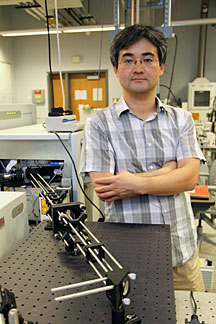- Number 372 |
- September 24, 2012
New technique yields never-before-seen information critical to biofuels research

Young-Jin Lee, a scientist at Ames
Laboratory,
has successfully
demonstrated the use of
matrix-assisted laser desorption/
ionization-mass spectrometry to map
the
distribution of metabolites in plant
tissues.
Pioneering mass spectrometry methods developed at DOE’s Ames Laboratory are helping plant biologists get their first glimpses of never-before-seen plant tissue structures.
The new method opens up new realms of study, ones that might have long-ranging implications for biofuels research and crop genetics.
The laboratory’s team of researchers has developed a new more highly sensitive mass spectrometry technique to investigate metabolites, the small molecules that are the building blocks for plant biological processes.
Ames Laboratory scientist Young-Jin Lee has successfully demonstrated the use of matrix-assisted laser desorption/ionization-mass spectrometry, or MALDI-MS, to map the lipids in cottonseed. The imaging technique can make maps of the locations of molecules in plant materials with resolution of 10 to 50 microns, less than a quarter the size of a human hair.
Traditional methods in gas chromatography and mass spectrometry told plant biologists the “what and how much” of plant metabolites, but not the “where.”
“The traditional methods provided qualitative and quantitative analysis, but it lost all localization of these small molecules,” said Lee. “With this technique we can see the distribution of these metabolites in the plant tissue at the single cell level.”
The Ames Lab research team believes the technology will be a key to thoroughly understanding plant biosynthesis, and in turn alternative energy production.[Laura Millsaps, 515.294.3474,
millsaps@ameslab.gov]
